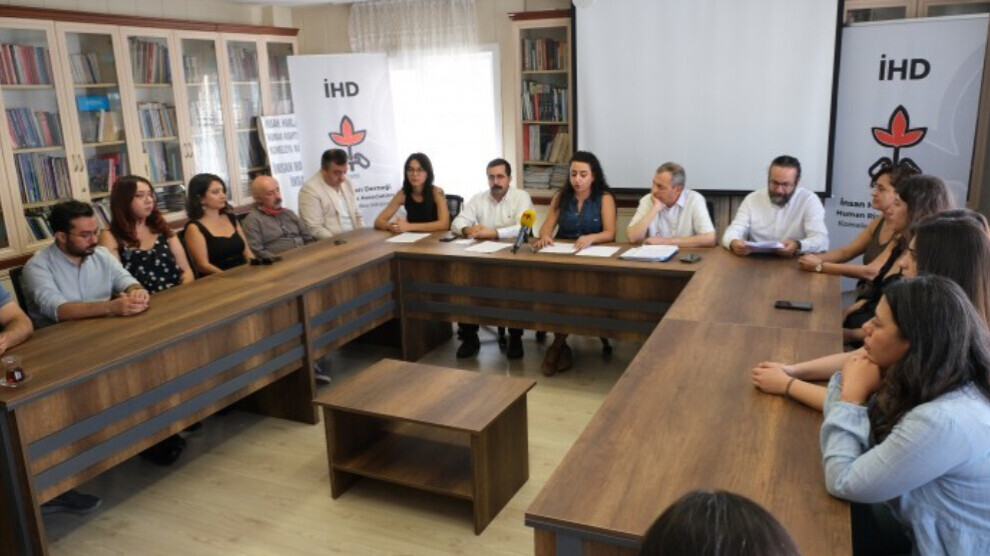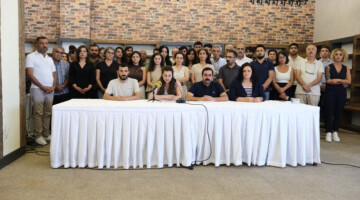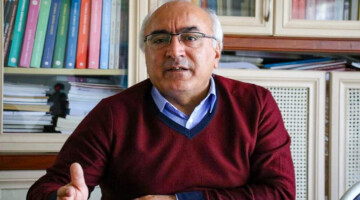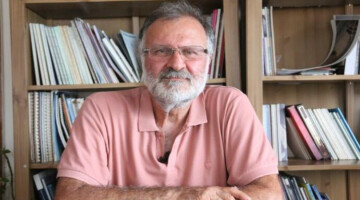Lawyers made a statement regarding the file on Kurdish People's Leader Abdullah Öcalan, which has been placed on the agenda of the Committee of Ministers of the Council of Europe due to the failure to eliminate the consequences of the European Court of Human Rights' (ECtHR) ruling that keeping a person in prison for life without the possibility of release is a “violation of the right to hope”.
The Association of Lawyers for Freedom (ÖHD), Association of Contemporary Lawyers (ÇHD), Human Rights Association (İHD), Human Rights Foundation of Turkey (TİHV), Society and Law Research Foundation (TOHAV) and Civil Society Association in the Penal Execution System (CİSST) organised a press conference before the Committee of Ministers meeting to be convened with the agenda of Abdullah Öcalan.
In the meeting held at the IHD Headquarters and attended by a large number of lawyers, ÖHD Headquarters member Ebru Akkal made a statement, pointing to the ECtHR's ‘violation of the right to hope’ judgement on Kurdish People's Leader Abdullah Öcalan on 18 March 2014. She noted that although 10 years have passed since the judgement, Turkey has not made any legal arrangements to eliminate the consequences of the violation. Ebru Akkal stated that: “The Committee of Ministers will repeat its periodic review of Turkey's non-compliance with the judgements of the ECtHR on the Öcalan 2, Kaytan, Gurban and Boltan Turkey file group in the session it will hold in September.”
Ebru Akkal underlined that Turkey has committed to implement the judgements of the ECtHR but has not fulfilled its obligations regarding the judgements. “Although 10 years have passed, thousands of prisoners, including the applicants, are deprived of their right to hope and are exposed to the severe and devastating consequences of this penal regime, which clearly violates the ECHR. Unfortunately, in its action plans prepared on many occasions, Turkey does not include legislative amendments or measures that would eliminate the current prohibition of conditional release and put an end to violations. Moreover, in its fifth periodic report to the United Nations Committee against Torture, Turkey expressed its unwillingness to rectify the situation without reservation. This situation, which is completely contrary to international law, is a clear indication that Turkey is rapidly moving away from its commitment to democracy and law, and from seeing universal human rights norms, of which it is a part, as a binding framework.”
Stating that the ‘violation of the right to hope’ judgement will affect thousands of people, Ebru Akkal urged the relevant authorities in Turkey to urgently comply with the ECtHR judgements and the recommendations of the UN Committee against Torture and asked the Committee of Ministers to do the following:
*Request statistical data from the Government of Turkey on the number of persons sentenced to aggravated life imprisonment in Turkey (to date), the number of persons sentenced to aggravated life imprisonment per year, the number of years in which the relevant judgements have been finalised and the number of years in which persons sentenced to aggravated life imprisonment have been held in prison.
*Urge Turkey to urgently make the necessary legislative changes and amend its legislation to ensure the non-discriminatory repeal of provisions in its legislation that categorically prohibit conditional release for certain offences.
*Review the execution of the Öcalan 2, Kaytan, Gurban and Boltan Turkey judgements at more frequent intervals and, in the absence of concrete progress by then, request the Secretariat of the Committee of Ministers to draft an interim decision in light of the next review of the case.
*Instruct the President of the Committee of Ministers or the Secretary General of the Committee of Ministers to strengthen the political dialogue with the relevant national counterparts on the implementation of the decisions in the context of the Reykjavik Declaration and to write to the authorities of the Government of Turkey on the individual and overall measures necessary for the implementation of the Gurban Group.
Speaking after Ebru Akkal, Metin Bakkalcı, President of the HRFT, said: “There are rights for everyone and no one can be subjected to violations. Everyone and no one can be subjected to violations. It is such a clear issue and there is no point in prolonging it. The law needs to be amended. There is no point in insisting on this. It is an unacceptable situation that has been going on for years. This issue will be resolved in any case in absolute terms.”
ÖHD Co-Chair Serhat Çakmak drew attention to the application made by many rights and legal organisations for the implementation of the decision on Abdullah Öcalan and continued: “Our application to the Committee should be considered as a threshold in terms of both the implementation of the decisions in domestic law and making legal amendments, and whether international mechanisms and these institutions continue their existence seriously. The fact that a decision made 10 years ago has not yet been amended in domestic law seriously casts doubt on the perspective of an international organisation or association towards law and universal values. We know that domestic politics and international balances are decisive behind the issue of whether the decisions are implemented or not.”
Criticising the failure of the government and the state to take steps, Çakmak said: “We would like to remind that by not taking the steps it should take, and by doing politics through policies of non-solution, it corrupts and decays the society politically and socially. What needs to be done in the face of this insolubility is to produce appropriate solutions regarding the reality of these lands. There is a policy that exists on the basis of insolubility.”
İbrahim Halil Vargün, Secretary General of İHD, drew attention to the fact that the ECHR must be respected. Vargün stated that Turkey is committed to acting in accordance with the convention, but day by day it is moving away from acting in accordance with it and other international conventions. Vargün underlined that this is equivalent to not recognising the law. Pointing to the detention conditions of Abdullah Öcalan, Vargün said,”‘It is against human rights and honour for a prisoner to remain in prison without the feeling that he will not regain his freedom even for a day. We want the government and the judiciary to implement this decision as soon as possible. We will follow up on this.”














